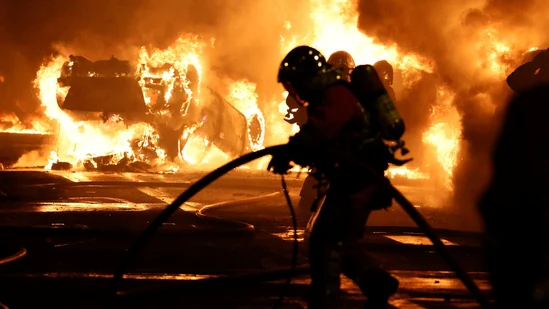Paris, France, June 30: Following a deadly police shooting of a 17-year-old teenager in Nanterre, a suburb of Paris, France is experiencing a surge of protests and violence. Even while most of the protests were peaceful, isolated instances of violence and destruction resulted in the arrest of hundreds of people.
The teenager, who was identified as Nael, was shot and killed by a police officer during a routine traffic stop close to the busy business sector.
The incident was caught on camera and was confirmed by Reuters. It showed two police officers next to a Mercedes AMG, with one of them firing at the teen driver as he pulled away. The local prosecutor reported that shortly later, Nael passed away from his wounds.
Following Nael’s unfortunate killing, the Nanterre residents organised a demonstration outside the police headquarters. In some places, crowds turned violent, torching garbage cans and barricades, destroying a bus stop, and firing firecrackers at the police. The use of tear gas and dispersion grenades by law officers in response was broadcasted by local media.
After Nanterre, demonstrations started in several French cities, especially in housing projects where prejudice, poverty, and a perception of unpunished police abuse are common.
In response, a homicide inquiry will now be conducted against the police officer who shot and killed Nael.
Macron administration has deployed 40,000 police officers to maintain law and order amidst the continuous riots as a response to the deteriorating scenario. Justice Minister Éric Dupond-Moretti said that 170 police officers were hurt as a result of the rioting that followed the police shooting. Following a second night of violence, authorities countrywide made 150 arrests in response, with the skirmishes injuring dozens of police personnel.
President Macron, in an emergency meeting, denounced the violence against police stations, schools, and town halls, emphasizing the unjustifiability of such acts against the institutions of the Republic.
The fatal shooting of Nael has amplified long-standing concerns regarding police violence within the low-income, racially diverse suburbs surrounding major French cities.
The episode is consistent with claims of systemic racism made against law enforcement, which President Macron has already refuted.
Ethnic minorities, particularly those of North African descent, have experienced a sense of police brutality, contributing to the prevailing sentiment.
While protests against police brutality are appropriate, there is a worry that extreme groups could take advantage of the situation to engage in anti-state activities.
The ongoing protests coincide with France’s broader challenges, including accusations of institutional discrimination and the growing threat of Islamic terrorism, with refugees arriving from former French colonies in West Asia.






